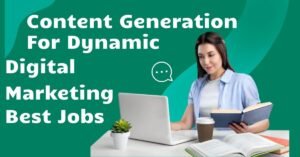
Discover how dynamic content generation revolutionizes digital marketing by enhancing user engagement, personalization, and conversions
Introduction
When it comes to digital marketing, the fringe is where things happen and you need to be a part of that for success. Dynamic content is web-based information whose purpose changes in response to querying by a user. By generating dynamic content, you will accomplish that and other things as well in your digital marketing campaign.
A New Frontier in Digital Marketing: The Power of Personalization
Now you have to start personalized. personalization has grown into such a crucial part of the successful digital marketing that is no longer optional. Customers enjoy personalized campaigns, which can result in higher conversion rates and loyalty to the brand.
The Functionality of Dynamic Content Generation
Dynamic content generation is creating adaptive, responsive ‘data-driven’ content that changes based on explicit cues. They can be user behavior, demographics of users, location or device type etc. Here’s how it:
Step 1: Data Collection This process initiates collecting data about the users. This may include your browsing history, what you have previously bought, videos that interest you, and social media. The more you have of those data, the better in terms of how to understand that audience and create content they will appreciate.
Step 2: This can be demographic information like age, location, or purchasing behavior for instance.
Dynamic Content in Digital Marketing
Dynamic content can come in all sorts of categories that, at any time while you open a message. Popular examples of dynamic content employed in digital marketing include:
Personalized Emails
By adding dynamic content to a website you can provide your users with immediate, real-time related information. For example, a travel site might use location data to display so users region-specific deals and offers.
Social Media Content
Another place where dynamic content can be very useful is on social media platforms. Some key benefits include. Enhances User Engagement This is one of the major advantages relevant to dynamic content.
Improved Customer Experience
Rich media content will add to a better customer experience that is more personalized and suitable for them. Even more so in today’s cutthroat environment — companies have to capitalize on their marketing spending.
Where the Difficulty Lies, Of course, Transitioning from Static Web Content to Dynamic Auto Generating Content. Though the advantages of dynamic content generation are hard to ignore, they do not come without drawbacks.
ses to have a solid CMS on the backend.
Measuring Effectiveness
Right now – erratic substances can be harder to measure than static content. Dynamic Content Generation Do’s and Donts — Best Practices Guide. Use Dynamic Content Generation Best Practices Tips to Get You Started
Start with Clear Goals
What is it you wish to accomplish with dynamic content? Will it improve your engagement, lead to conversions, or enhance the buyer experience?
Invest in the Right Tools
To deliver dynamic content effectively, you will require the proper tools and technologies. For instance, a customer relationship management (CRM) system, content management systems (CMS), and a stack of marketing automation tools. Dynamic content is only as useful as your data quality. Dynamic content is only as good as the data that you build it on.
Test and Optimize
As with any kind of marketing, testing and optimization are imperative to success. Experiment with different iterations of your dynamic content, and analyze the results to make it data-driven. Decisions on how you can better optimize for contemporary modern media.
Prioritize User Privacy
Considering that data is paramount for dynamic content generation, there should be a pressing priority on maintaining user. Long term, building trust with your followers is key. What we Expect for the Future of Dynamic Content Generation
Digital marketing is an ever-changing field, and the generation of content that follows suit is equally as fluid. Some of the future trends that will likely influence what way businesses leverage dynamic content are:
AI-Powered Personalization
The future of dynamic content generation holds huge promise for artificial intelligence. It will allow companies to provide their audience with still richer and personalized content.
